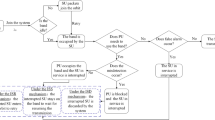Abstract
Efficient sharing of communication resources is essential to PCS networks since the wireless bandwidth is limited. The Resource Auction Multiple Access (RAMA) protocol was recently proposed for fast resource assignment and handover in wireless PCS networks. The RAMA protocol assigns available communication resources (e.g., TDMA time slots or frequency channels) to subscribers one at a time using a collision resolution protocol based on subscriber ID's. However, the RAMA protocol encounters an unfairness problem; furthermore, performance results also indicate that it is inefficient at transmitting fixed-length subscriber ID's. Moreover, the emerging services such as teleconferencing have been presenting new challenges to dynamic-priority resource assignment. In this paper, we propose a modification to the RAMA protocol to improve its performance and resolve the unfairness problem. The proposed protocol also adopts dynamic priority assignment to improve the QOS for subscribers in overload environments.
Similar content being viewed by others
References
D.-H. Alexandra, J. Holtzman and Z. Zvonar, Multiuser detection for CDMA systems, IEEE Personal Communications (April 1995) 46–58.
N. Amitay, Resource Auction Multiple Access (RAMA): Efficient method for fast resource assignment in decentralized wireless PCS, Electronics Letters 28(8) (1992) 799–801.
N. Amitay, Distributed switching and control with fast resource assignment/ handoff for personal communications systems, IEEE Journal on Selected Areas in Communications 11(6) (1993) 842–849.
N. Amitay, Resource Auction Multiple Access (RAMA) in the cellular environment, IEEE Transactions on Vehicular Technology 43(4) (1994) 1101–1110.
D.C. Cox, Personal communications-A viewpoint, IEEE Communications Magazine 128(11) (1990).
D.C. Cox, Wireless personal communications: What is it? IEEE Personal Communications Magazine 2(2) (1995) 20–35.
G.H. Forman and J. Zahorjan, The challenges of mobile computing, IEEE Computer (April 1994) 38–47.
R. Ghai and S. Singh, An architecture and communication protocol for picocellular networks, IEEE Personal Communication (Third Quarter 1994) 36–46.
D.J. Goodman et al., Packet reservation multiple access for local wireless communications, IEEE Transactions on Communications 37(8) (1989) 885–890.
M.J. Karol and C.H. I, A protocol for fast resource assignment in wireless PCS, IEEE Transactions on Vehicular Technology 43(3) (1994) 727–732.
Y.B. Lin, S. Mohan and A. Noerpel, PCS channel assignment strategies for hand-off and initial access, IEEE Personal Communications (Third Quarter 1994) 2–11.
A. Noerpel and Y.B. Lin, Handover management for a PCS network, submitted for publication (1995).
A.S. Tanenbaum, Computer Networks, 2nd ed. (Prentice-Hall, Englewood Cliffs, NJ, 1988).
M. Woo, N. Prabhu and A. Ghafoor, Dynamic resource allocation for multimedia services in mobile communications environments, IEEE Journal on Selected Areas in Communications 13(5) (1995) 913–922.
Author information
Authors and Affiliations
Rights and permissions
About this article
Cite this article
Wang, TP., Tseng, CC. & Hwang, SY. A fair protocol for fast resource assignment in wireless PCS networks. Wireless Networks 5, 33–40 (1999). https://doi.org/10.1023/A:1019114003455
Issue Date:
DOI: https://doi.org/10.1023/A:1019114003455




